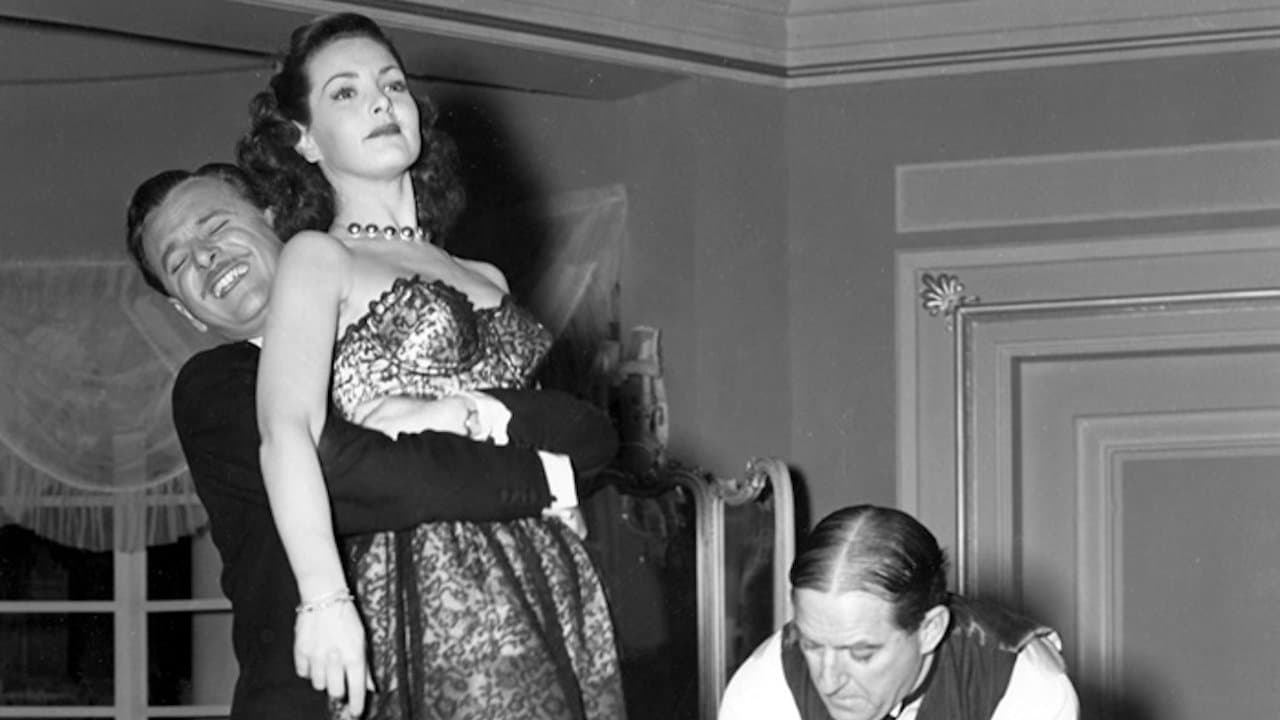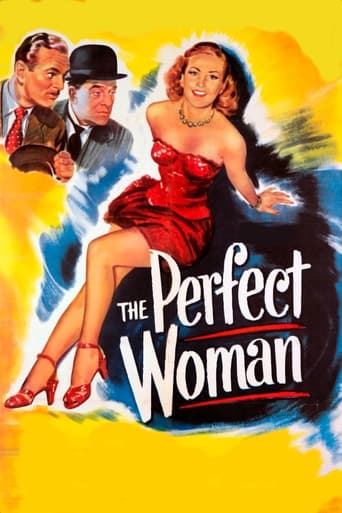Karry
Best movie of this year hands down!
Beystiman
It's fun, it's light, [but] it has a hard time when its tries to get heavy.
Allissa
.Like the great film, it's made with a great deal of visible affection both in front of and behind the camera.
keith-moyes-656-481491
The Perfect Woman is an amusing British farce from the late Forties that I have wanted to see for years and have finally managed to catch up with. Overall, I think it was worth the wait.The central comic idea of a robot being impersonated by her look-alike is beautifully realised. As Penelope assiduously responds to all Olga's key words, while attempting to preserve her modesty without revealing her imposture, I soon found myself chuckling appreciatively at the precision of the staging and the pantomime. Patricia Roc is delightful and handles the physical comedy superbly well. I am slightly surprised that she did not become better known.It was also good to see Irene Handl and Dora Bryan looking so young and sprightly.However, I cannot claim that this picture is an overlooked minor classic and I have to acknowledge that it has a number of weaknesses.The problems begin with the two male leads.Stanley Holloway was probably the biggest star in the picture, but his character is undeveloped and only exists to give Roger Cavendish someone to talk to. Holloway's actual performance is quite restrained, with none of the frantic over-reaction that another reviewer has reported, but he has very little to work with and is unable to add much to the movie.Nigel Patrick was an accomplished actor but here he is saddled with an impossible character. These pencil-moustached, down-on-their-luck, ageing playboys regularly turned up in English movies until well into the Sixties (Leslie Phillips built his whole career on them) but they are tough going today. In this movie, Roger Cavendish is meant to be dashing and debonair but today he just seems a bit shabby and creepy.More importantly, the main comic premise may be a good basis for a series of sketches, but it is too slight to sustain a full-length feature film. The early scenes are over-written and overlong (probably reflecting its origins on the stage) but once the characters have been introduced, and the situation has been set up, the movie quickly builds up a good head of steam. There are then some very effective comic scenes in the middle of the picture, but eventually the possibilities of the robot impersonation are exhausted and there is nowhere else for the story to go. This is when we start to ask why Penelope is so determined to maintain her impersonation of Olga (it must be simple fun and devilment, because there is no plot reason for it).At this point, the movie can only be stretched to the full 90 minutes by violating one of the basic rules of good farce: the situations may be contrived and far-fetched but the characters should always respond to them in plausible ways. In the final third of this movie, people continually act out of character in order to prolong the situation beyond its natural limits.For example, the dinner scene is beautifully choreographed, but requires the hotel manager to be too pushy and insistent and Roger to be uncharacteristically feeble: instead of stuttering explanations, he should just have ushered this pest out of the room. Similarly, it was out of character for his Aunt to intrude on what she thought was his wedding night, or for him to allow it.In a farce, it is fine for characters to exasperate each other, but it is fatal for them to exasperate the audience.Despite these drawbacks, I am sure this droll little picture amused a lot of people in 1949 and much of it still amuses me today. It is certainly not the archaic museum piece that other reviewers have implied and I would strenuously reject any suggestion that it shows how much more sophisticated our taste in comedy has become over the years.If you doubt me, I would just remind you that Mike Myers's wretched accents, crude mugging and off-target parody did not stop the Austin Powers movies from being one of the biggest grossing comedy series in history.The Perfect Woman is no comedy classic, but it is a hell of a lot more adroit than those three clunkers.
suchenwi
While this film sometimes has the subtlety of a Punch and Judy show, at other times it certainly brought me good laughs, and it milked many jokes out of the Mechanical Woman topic. Then there are foreigner stereotypes about the Italian hotel manager and the Swiss waiter, some being less painful than others. Then again, the catastrophic finale triggered by "love" very well wraps it up... The scenes in the Underground were quite well executed, where the smoking ears were a bit over the top.I watched this shortly after "Die Puppe" (Ernst Lubitsch, 1919) which had a similar concept as center of the plot: an artisan builds a lifelike woman robot as the likeness of his daughter/niece, but for public appearance, the original must double up as the copy, the real woman acting as if she were the robot. A mouse/hairpin destroys the illusion.In this juxtaposition, I found The Perfect Woman a very interesting watch - compare how Ossi Oswalda (in Die Puppe) and Patricia Roc in this play the most difficult role, both halfway plausible, and very charming.I give it 9/10 - not for great cinematic art, but for the fun I had.
zeppo-2
As a British attempt to do some American 'screwball' comedy, it falls very short of the mark. Perhaps the same vehicle in the hands of someone like Cary Grant could have made it work but not the set of actors in this. As a traditional British farce it works better but not by much, and sadly points up the fact that light comedy was not really Nigel Patrick's forte.In a short role as a effeminate dress sales clerk, Jerry Desmonde goes as far as you could without shouting out 'gay man,' in the days of fifties cinema. Pity his later roles were mainly playing stooge to the likes of Norman Wisdom.This type of broad slapstick farce and comedy of errors was slowly dying out to be replaced by the more subtle Ealing comedies. And wouldn't really return till the more risqué Carry Ons of the swinging sixties.All a bit dated in all and only vaguely amusing in the sense of 'they don't make them like that any more' type of way.
fotlock
I stumbled upon this movie one afternoon on TV. It's a pacey movie when compared to many British Movies of this era (Bernard Knowles experience as cinematographer on Hitch's 39 Steps may have benefitted him in this respect). The cast are splendid, if somewhat theatrical (English Farce), especially Miles Malleson as the dotty old inventor.What fascinated me most was the similarities I began to notice with the acting of Leslie Banks as Cavendish with that of the exasperation of Basil Fawlty in "Fawlty Towers" a British TV show by ex-python John Cleese. The tortured expressions and heavily exaggerated body language were the first things to alert me to the "FT" connection. But there was more...The pace increased exponentially along with the emerging complications of taking a beautiful female robot (impersonated by Malleson's neice) to a honeymoon suite in a posh hotel until the film ended in total chaos.A foreign servant who spoke very little english and frequently misunderstood his manager's requests (Hmm, Manuel methinks!).

